The Proverbs of Hell 23/39: Naka-Choko
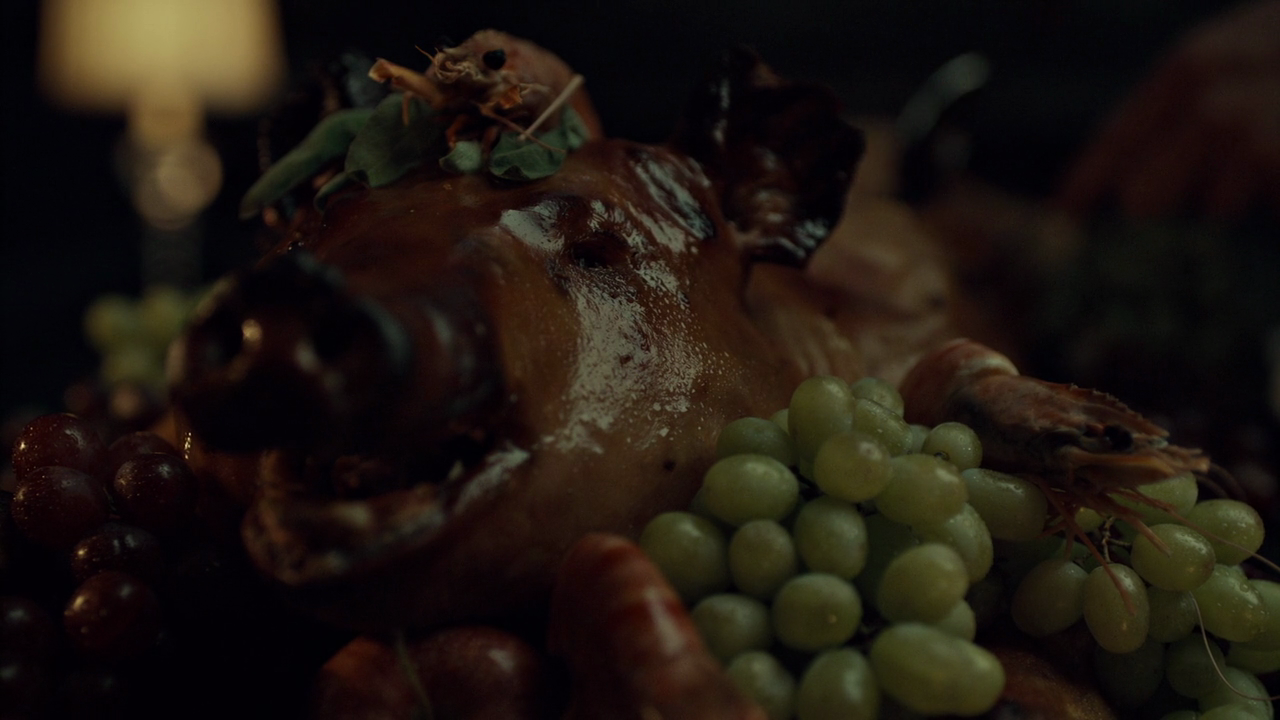 NAKA-CHOKO: A citrusy soup, used as a palate cleanser. Hannibal does suggest that a meat has citrus notes, but that’s a stretch. Not even Janice Poon tries to explain this one.
NAKA-CHOKO: A citrusy soup, used as a palate cleanser. Hannibal does suggest that a meat has citrus notes, but that’s a stretch. Not even Janice Poon tries to explain this one.
It is tempting to say that this episode opens with a revision of the previous one’s finale, but based on the scripts it’s more accurate to say that the previous episode’s finale was revised to be a streamlined version of this opening, cutting the actual fight scene down to Randall bursting through the glass (and making one other major change, which we’ll get to in a moment). Here we get the psychic landscape version, in which Will murders Randall-as-representation-of-Hannibal, which, in light of the cuts to the previous episode, becomes the sole and definitive version.
WILL GRAHAM: I’d say this makes us even. I sent someone to kill you, you sent someone to kill me. Even-steven.
HANNIBAL: Consider it an act of reciprocity. One positive action begets another.
WILL GRAHAM: Polite society normally puts such taboos on taking a life.
HANNIBAL: Without death, we’d be at a loss. It’s the prospect of death that drives us to greatness.
The other post-shooting script revision to the end of “Shiizakana” is the addition of the first line of this scene, which, while good for the line in that it gets to stand out as the solid punchline it is, but in hindsight is not as good an ending as a silent face-off between Will and Hannibal over Randall’s corpse and also screws up the start of this episode.
Hannibal’s happiness at Will not only killing someone again but at bringing him the corpse as a present, meanwhile, has him in an unusually loquacious mood, admitting casually to his artistic genius in a way he’s usually too polite for.
The scene of Hannibal washing Will’s bloodied hands, especially after a bit of dialogue in which killing Randall with his hands was equated with intimacy, is actually probably even slashier than the bondage murder at the start of “Shiizakana.” Astonishingly, however, it’s not the most explicitly homoerotic thing in the episode (homoerotic being distinct from slashy, though obviously not unrelated).
HANNIBAL: Don’t go inside, Will. You’ll want to retreat, you’ll want it as we want to jump from balconies, as the glint of the rails tempts us when we hear the approaching train. Stay with me.
WILL GRAHAM: Where else am I going to go?
HANNIBAL: You have everywhere to go. As long as you buttress your mind against deterring forces like guilt. You should be quite pleased. I am.
Hannibal’s first line is interpolated from Hannibal, where it’s originally used to describe Clarice’s desire to step inside Hannibal’s old cell, as opposed to a retreat inside one’s own mind. But for all that I tend to go on about the distinctive flair of Harris’s language, it’s worth noting that Hannibal’s second line, at least based on my searches, appears to be entirely the product of Steve Lightfoot, seamlessly picking up on the textual tone of the preceding Harris line even as he comes nowhere near the sheer flair of Harris’s metaphors.
And so Will constructs his first murder tableau. His artistic influences in this regard are almost recklessly obvious, to the point where it is difficult at first glance to even tell that this is not the Chesapeake Ripper, although the lack of “surgical trophies” ought provide cover. (This does, however, raise the interesting hypothetical – would Hannibal have minded if Will aped his style in this context?)
JACK CRAWFORD: His killer chose not to dispose of his body, but to display it.
HANNIBAL: A jarring reminder of death’s informality.
JACK CRAWFORD: Randall Tier was denied a respectable end that he himself denied others.
HANNIBAL: Dissection is disgrace. This is a humiliation, a final indignity.
WILL GRAHAM: He isn’t mocking him. This isn’t disdain. He’s commemorating him.
HANNIBAL: This killer has no fear for the consequences of what he’s done.
WILL GRAHAM: No guilt.
Will and Hannibal bicker pointedly over the precise interpretation of Will’s work, with Hannibal showing an unsurprising deference to authorial intent given his investment in the notion of his own genius. Jack’s expression as they do so, especially given that he knows full well what happened here, is a sublimely low key bit of dark comedy on Lawrence Fishburne’s part.
RANDALL TIER: Can you see you?
WILL GRAHAM: Clearer and clearer. You forced me to kill you.
RANDALL TIER: I didn’t force you to enjoy it. You made me a monument.
WILL GRAHAM: You’re welcome.
RANDALL TIER: The monument is not to me. It’s to you. This is pride.
WILL GRAHAM: I gave you what you want. This is who you are. What you feel finally matches the reality of what I see.
RANDALL TIER: This is my becoming. And yours.
WILL GRAHAM: This is my design.
Almost every part of this is fascinating, from the basic fact of Will entering pendulum-space to investigate a murder he committed onwards. On the one hand, the use of pendulum-space grants a validity to Randall’s dialogue – it’s not an imagined conversation but rather an empathic recreation. On the other, however, Will isn’t reconstructing Randall’s actions but his own – that’s what he does at crime scenes, and there’s no real reason to read the pendulum differently in this context.
“What you feel finally matches the reality of what I see” is surprisingly cruel, even given its context. The sting comes in the construction, and the way in which Will’s vision is given priority, with Randall’s internal sense shifted to conform to it. This is purely a trick of word order – the thing Will has clearly changed is what he sees as opposed to what Randall feels – but the implication remains in the phrasing.
Finally there is Will’s rejection of the idea that this is his becoming. This is not, one suspects, because killing does not change him, but because he has already become and is now playing an entirely different sort of game.
WILL GRAHAM: He knew his killer. There is a familiarity here. It was someone who met him, understood him. It was someone like him. Different pathology, same instinct.
JACK CRAWFORD: His killer empathized with him?
WILL GRAHAM: Don’t mistake empathy for understanding, Jack. If there’s anything, it’s envy.
JACK CRAWFORD: Envy?
WILL GRAHAM: Randall Tier came into his own much easier than whoever killed him.
HANNIBAL: This is a fledgling killer. He’s never killed before, not like this.
WILL GRAHAM: No, not like this. This is the nightmare that followed him out of his dreams.
Will’s disavowal of empathy is interesting and difficult to take as entirely honest on his part, even as he admits to the superficially more damning envy. But the envy contrasts sharply with the preceding sequence’s rejection of the idea that this was his becoming. The easiest way to split the difference is to assume Will’s rejection of becoming was not that it was already complete but that it hadn’t happened yet, but this is difficult to square away with his progress in therapy.
“The nightmare that followed him out of his dreams” is not, in fact, a Thomas Harris line, which further establishes Lightfoot as a strong tonal mimic.
Enter Mason Verger, looking unsettlingly like friend of the site Mac Rogers, whose podcast Steal the Stars has been getting fantastic notes, and who is apparently writing Torchwood for Big Finish now too. Which is much better than Mason Verger is going to do.
MASON VERGER: I want to share something with you. This is Pavlov. Say hello, Pavlov.
PAVLOV: *squeal*
MASON VERGER: Say hello. Margot, say hello to Pavlov.
MARGOT VERGER: Hi, pretty.
“Pavlov” is a deliciously bleak name for the pig given that what Mason is breeding them for is to eat human flesh.
MASON VERGER: Taken awhile to find the perfect mix. Any pig will eat a dead man, but to get him to eat a live one, some education is required. Carlo is experienced in this field and actually fed a man to pigs in Tuscany twenty years ago.
MARGOT VERGER: That’s one of my suits.
MASON VERGER: I’ll buy you a new one. We stuff clothes with meat, scent it with human smells. Play screams every time they’re fed. Come the real thing, we won’t need the recording.
The problem with Mason as a villain quickly becomes clear – for all that his Grand Guignol sadism is delightful on any given occasion, it’s an awful tough note to have played constantly and at full volume. The thing that makes it work is Katharine Isabelle’s delivery of “that’s one of my suits,” done without a trace of fear or intimidation, but instead in a resigned pout.
One of the two, erm, climaxes to a stunning three minute long hallucinatory sex scene that is simultaneously the best, sexiest, and most wildly excessive thing the show has ever done. (Of course, those are all synonyms when it comes to Hannibal.) Of the two this is the better and more compelling one – a jarring intrusion as perspectives and subjectivities collapse, and one that combines the sensual and animalistic in ways that reflect the show’s themes back at odd and unsettling angles.
This, on the other hand, is a crashing unsubtlety that the show should be better than. There’s no intriguing visual to it – it’s just three people in a bed, a love triangle that was hardly the show’s best aspect to begin with depicted without further nuance or ambiguity.
FREDDIE LOUNDS: Hannibal Lecter taught you when you were an impressionable young mind.
ALANA BLOOM: Your book’s about Will Graham, Freddie, it’s not about me.
FREDDIE LOUNDS: Were you sleeping with Dr. Lecter when you were his student? Or is that a recent development?
(Alana shoots Freddie a look.)
FREDDIE LOUNDS: You are sleeping with him. I was just guessing. Figured you had to be sleeping with one of them. Maybe that’s why you can’t see it.
Freddie, as per usual, approaches situations with a refreshing crassness and gets entertaining results by doing so. Although in this case the entertainment is mostly in her call-out of how Alanna’s plot this season is a banal cliche.
MASON VERGER: They’re a special breed. Product of many years and many litters.
HANNIBAL: Your ground note?
MASON VERGER: Started with the giant forest pig. Six teats and thirty-eight chromosomes, a resourceful feeder and an opportunistic omnivore.
HANNIBAL: Just like man. You bred the forest pig with a European wild boar.
MASON VERGER: Among others. You know pigs as well as you know people.
HANNIBAL: I do know pigs.
A particularly funny “I’m a cannibalistic serial killer” admission from Hannibal just for the sheer height at which it is set to go over Mason’s head.
MASON VERGER: I have always been the favorite. That’s why Margot tried to kill me. Does she confess her plots to you?
HANNIBAL: I can’t tell you what Margot’s confessed to me. Fortunately for you, I can’t tell anyone else. Even the worst of us needs someone to talk to, Mason. Have you ever considered therapy for yourself?
MASON VERGER: Maybe I should. Can I have Carlo slaughter you a hog? A token of my appreciation for all that you do for Margot.
HANNIBAL: Please, but I must insist on selecting my own pig. Always do.
In which Hannibal selects two pigs in rapid succession.
WILL GRAHAM: There really is a very good explanation for all of this.
FREDDIE LOUNDS: I don’t want to hear it.
WILL GRAHAM: You’re not the least bit curious?
FREDDIE LOUNDS: Get away from the door.
WILL GRAHAM: I can’t let you go, Freddie. Not without hearing what I have to say. I know you’re scared. Only have to be scared just a little bit longer.
An ugly contrivance. As will eventually be revealed, Will does not in fact kill Freddie in this scene, but his demeanor is patently murderous – every single decision he makes in this scene exists only to terrorize Freddie. Narratively this is motivated by a desire to conceal her survival until the end of “Ko No Mono,” but personally it’s wholly inexplicable in its cruelty. For all his emnity towards Freddie, he’s not this kind of sadist.
HANNIBAL: The meat has an interesting flavor. It’s bracing. Notes of citrus.
WILL GRAHAM: My palate isn’t as refined as yours.
HANNIBAL: Apart from humane considerations, it’s more flavorful for animals to be stress-free prior to slaughter. This animal tastes frightened.
WILL GRAHAM: What does “frightened” taste like?
HANNIBAL: It’s acidic.
WILL GRAHAM: The meat is bitter about being dead.
HANNIBAL: This meat isn’t pork.
WILL GRAHAM: It’s long pig.
Hannibal and Will’s conversation about faux-Freddie is full of insights, with Will’s summary of Hannibal’s flavor notes probably being the highlight. (The funniest line, on the other hand, is Hannibal’s declaration that Will can chop the ginger.) The concern, though, is the final line. “Long pig” is a euphemism for cannibalism, but even if Will hadn’t said as much, Hannibal can surely identify human flesh and knows full well who he’s eating. So who is it, given that Freddie’s alive? The obvious answer is Randall, whose meat she found in Will’s chest freezer, but given that Hannibal can diagnose cancer and pregnancy by smell it seems like he should be able to identify a meat’s gender as well.
WILL GRAHAM: You can’t reduce me to a set of influences. I’m not the product of anything. I’ve given up good and evil for behaviorism.
HANNIBAL: Then you can’t say that I’m evil.
WILL GRAHAM: You’re destructive. Same thing.
HANNIBAL: Evil’s just destructive? Storms are evil, if it’s that simple. And we have fire, and then there’s hail. Underwriters lump it all under “Acts of God.” Is this meal an act of God, Will?
A Silence of the Lambs riff in which Will adopts both Hannibal and Clarice’s lines, with Hannibal eventually claiming his own lines in spurious justification. The overall effect, in terms of Will’s perspective, is bleakly self destructive.

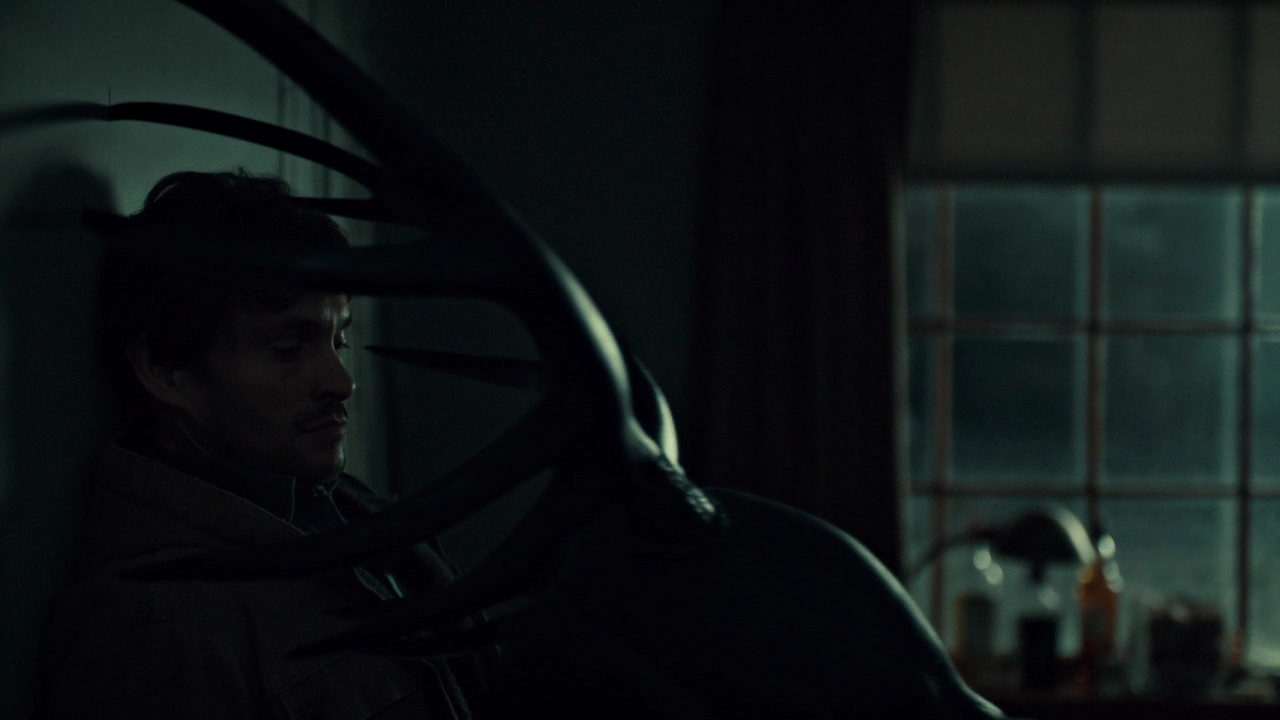
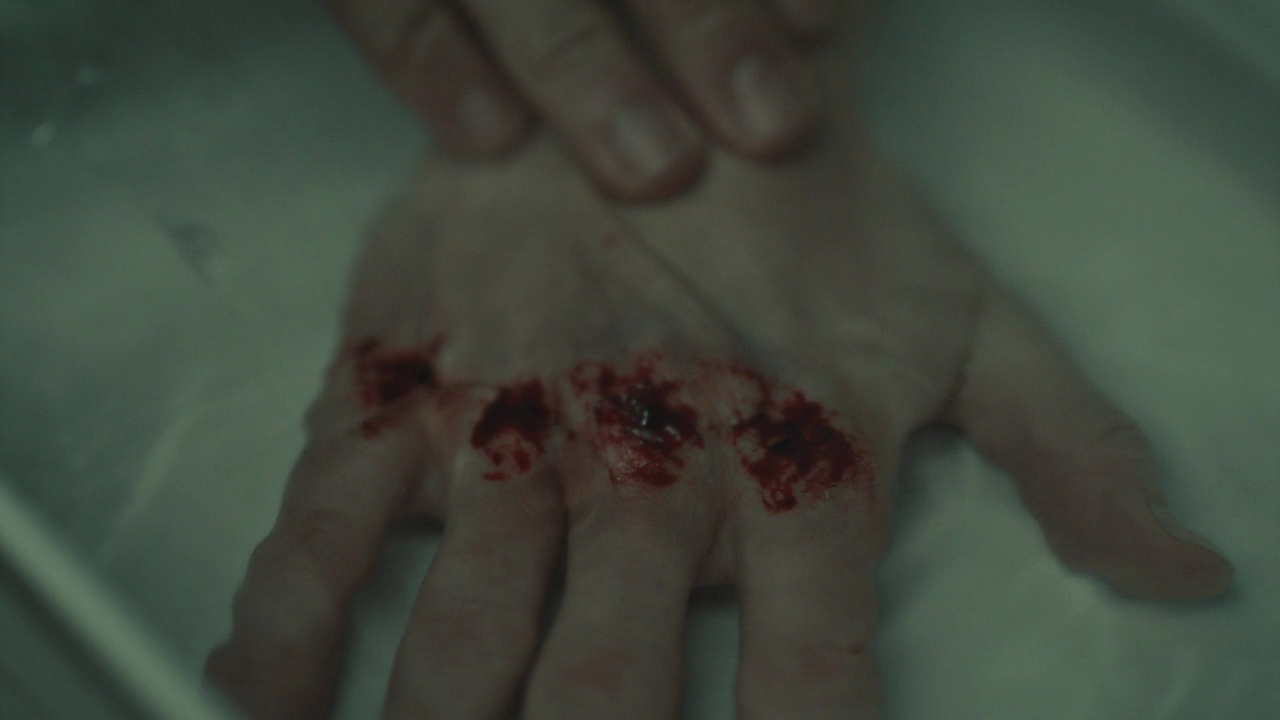
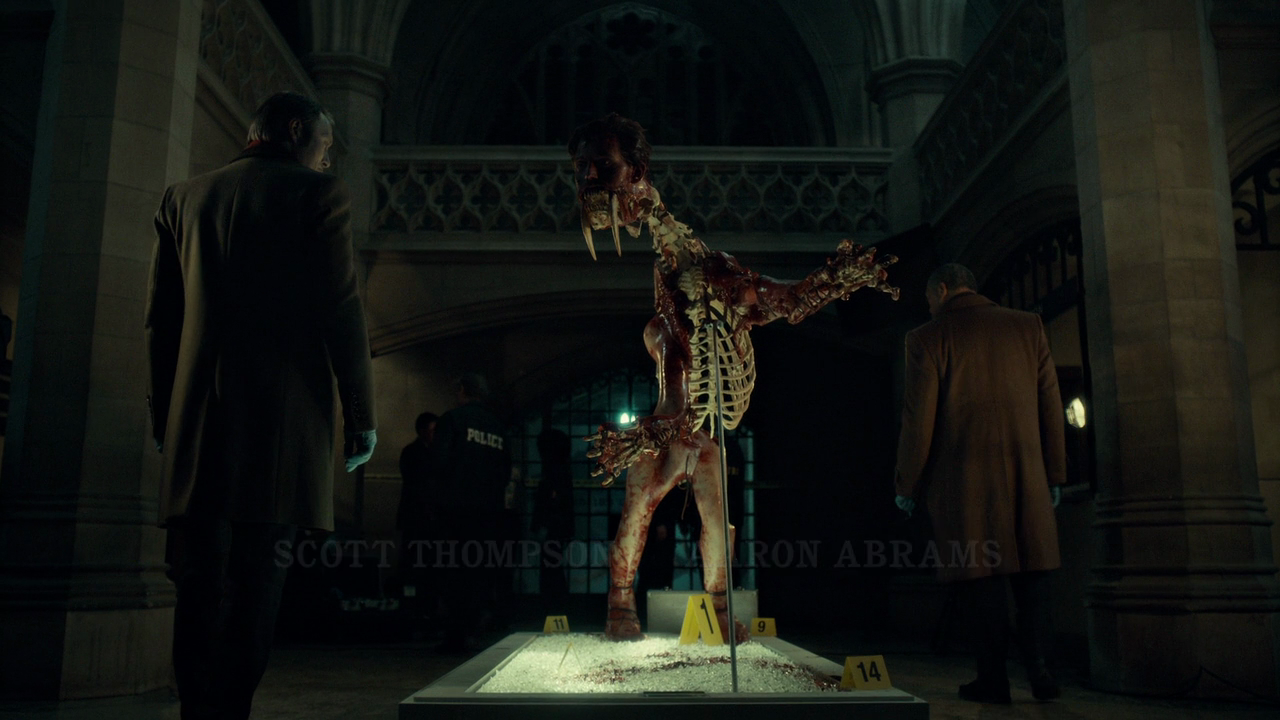
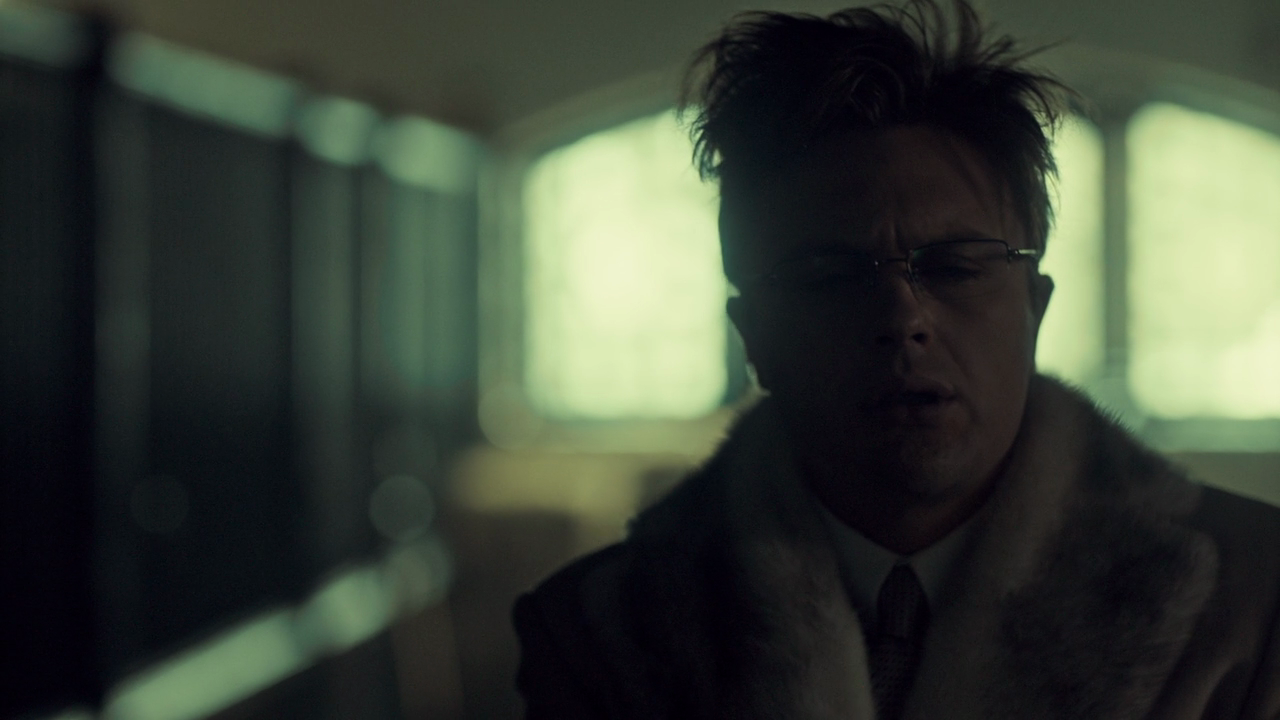
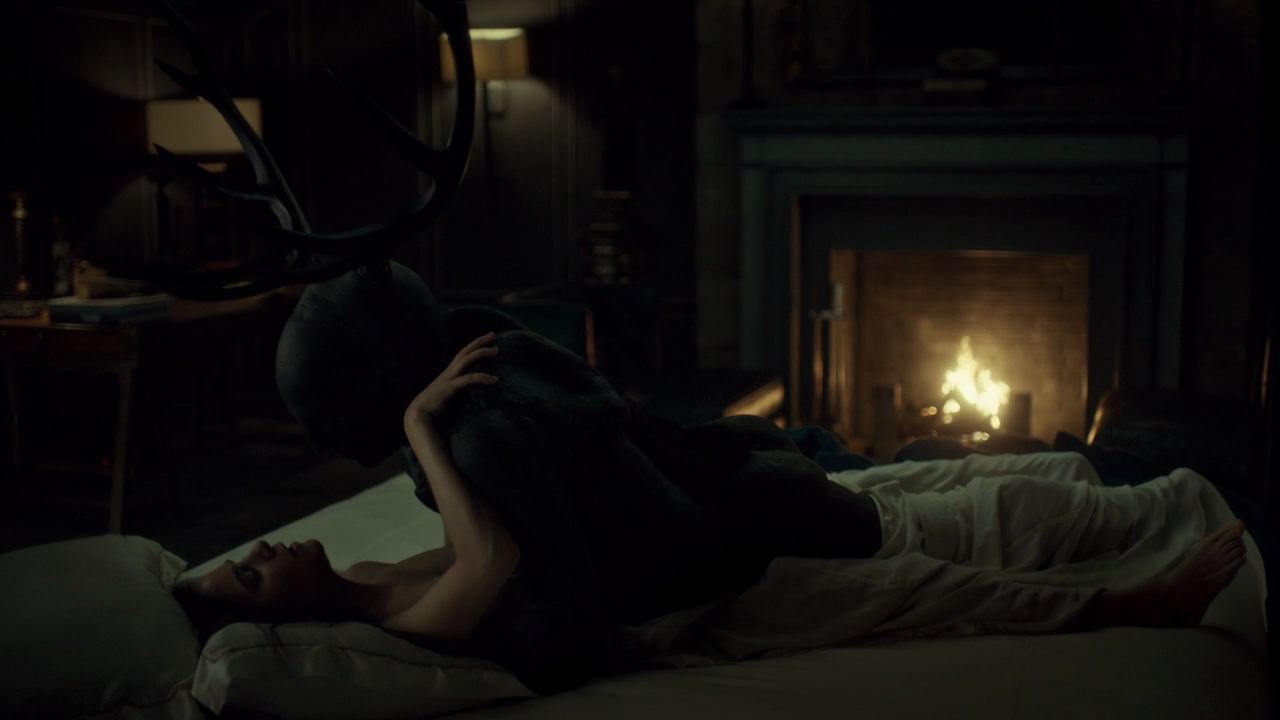
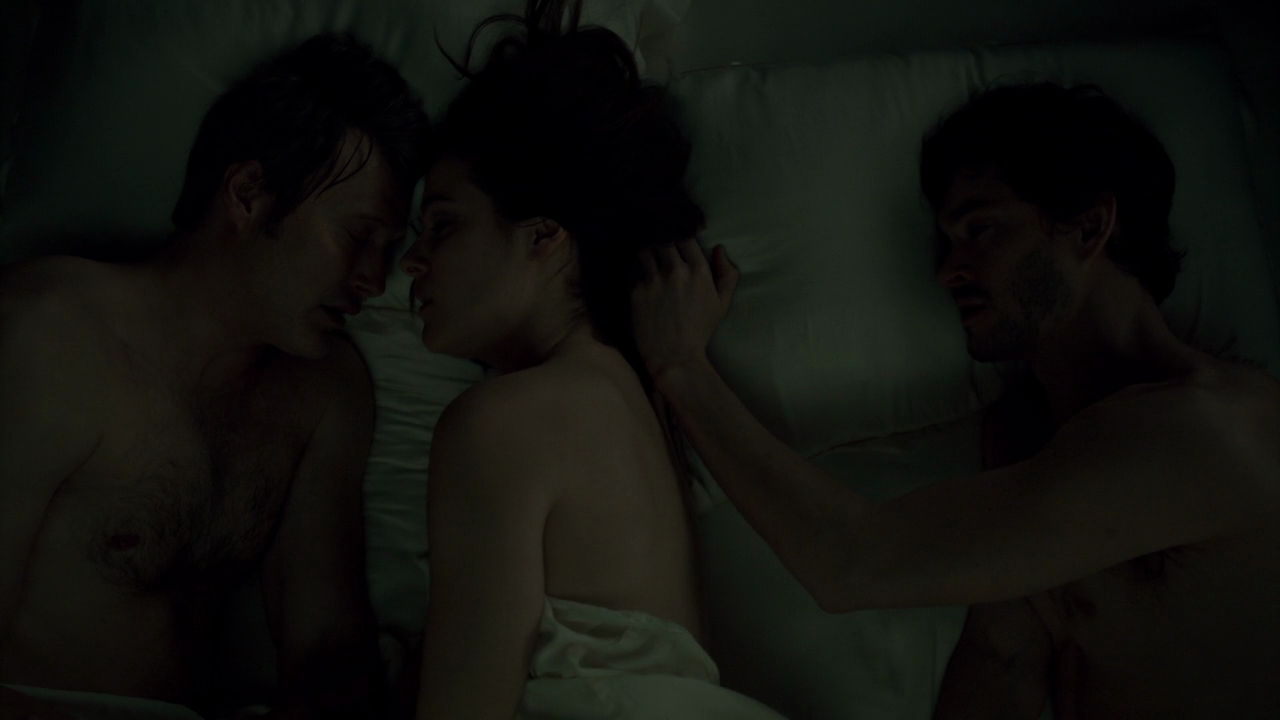
October 3, 2017 @ 12:17 pm
One of the things I love about Hannibal is the fact that you can show him having sex without diminishing him as a villain. So many villains fall apart if you try to imagine them as sexual beings. (For those who had the misfortune of reading “Harry Potter and the Cursed Child” – just imagine Voldemort during coitus. It’s just hilarious). Hannibal loses none of his dangerous, predatory nature when put in that context. If anything, he becomes even more unsettling. Hell, even imagining Hannibal on the toilet doesn’t make him less scary. He’s way too physical, animalistic, carnal for that.
October 3, 2017 @ 12:44 pm
Also, Will’s definition of evil is perhaps too reductive, but makes for a surprisingly effective rule of thumb for day-to-day use. Storms may not be evil, but people commiting destructive acts usually are, never mind their motivation or intent. And I’d argue that there aren’t very many destructive acts that aren’t evil.